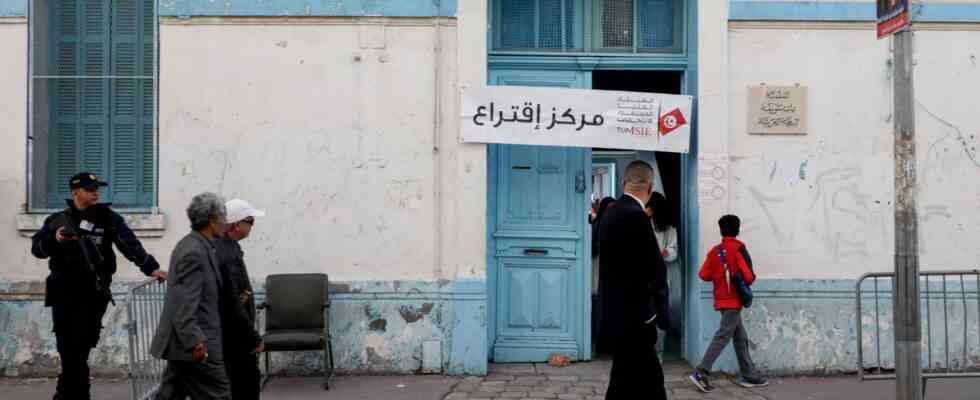Status: 12/18/2022 3:33 a.m
After calls for a boycott, not even one in ten eligible voters took part in the parliamentary elections in Tunisia. The opposition spoke of a “fiasco” and called on President Saied to resign.
The vast majority of those entitled to vote stayed away from the parliamentary elections in Tunisia. The turnout was only about 8.8 percent, as the electoral authority announced after the polling stations closed on Saturday. In the previous parliamentary election in 2019, 40 percent of those eligible to vote took part.
The head of the electoral authority, Faruk Buasker, spoke of a “modest” turnout – which he attributed to the fact that, unlike in previous elections, there was a lack of financial help from abroad for the ballot. At the same time, he emphasized that it was a clean election “without buying votes”. Preliminary results are expected on Monday.
Tunisia elects new parliament
Kristina Böker, SWR, currently Tunis, daily news at 8:00 p.m., December 17, 2022
opposition boycott
The low turnout in the election was expected. The opposition had called for a boycott. She accuses President Kais Saied of undermining democracy. The influential Tunisian trade union federation UGTT, which has many members and has long stood by Saied, also called the parliamentary elections “not very useful”.
As a result, the restructuring of the state being pursued by Saied finds little support among the population. As late as Saturday morning, Saied appealed to the Tunisians to vote. In his vote, the head of state described the election as a “historic opportunity” for citizens to “regain their legitimate rights”. Tunisia “broke with those who ruined the country”.
Call for protests and sit-ins
The opposition united in the “Rescue Front” called on Saied to resign from office. “What happened today is like an earthquake,” said Rescue Front chief Nejib Chebbi. “From this moment on, we consider Saied an illegitimate president and demand his resignation after this fiasco.”
The “Rescue Front” called for protests and sit-ins. It includes several parties, including the Islamist Ennahda, which was the largest faction in the old parliament.
Few powers left for new parliament
The election campaign had been extremely subdued, with no real debates and few posters. Individual candidates – mostly little known – applied for the parliamentary mandates and not representatives of parties. Around nine million people were called to vote.
President Saied has been criticized for wanting to weaken parliament and the separation of powers.
Image: AP
The new Parliament will consist of 161 MPs. In some constituencies, however, there are no candidates, so that the parliament will not be fully occupied until further notice.
Saied had dissolved the old parliament at the end of March. Since the introduction of a controversial new constitution in the summer, the head of state has been able to appoint and dismiss the government and judges without the approval of parliament. The new representative body will only have a few powers.
Big economic problems
Saied has justified the reforms he pushed through as necessary to overcome corruption, political deadlock and economic stagnation. Initially, his measures were acclaimed by parts of the population and were long regarded as a beacon of hope. In the meantime, however, its popularity ratings are falling rapidly.
More and more young Tunisians are making their way to Europe to find work and prospects there. So far, politicians have not found any solutions to the economic turmoil and high unemployment in the country
For a significant part of the Tunisian population, the standard of living has deteriorated significantly in recent years. Tunisia is suffering from an economic crisis that has been exacerbated by the corona pandemic and the Ukraine war. The North African country is heavily dependent on oil and grain imports.
Parliamentary elections in Tunisia – and nobody goes?
Dunja Sadaqi, ARD Rabat, 17.12.2022 4:51 p.m

